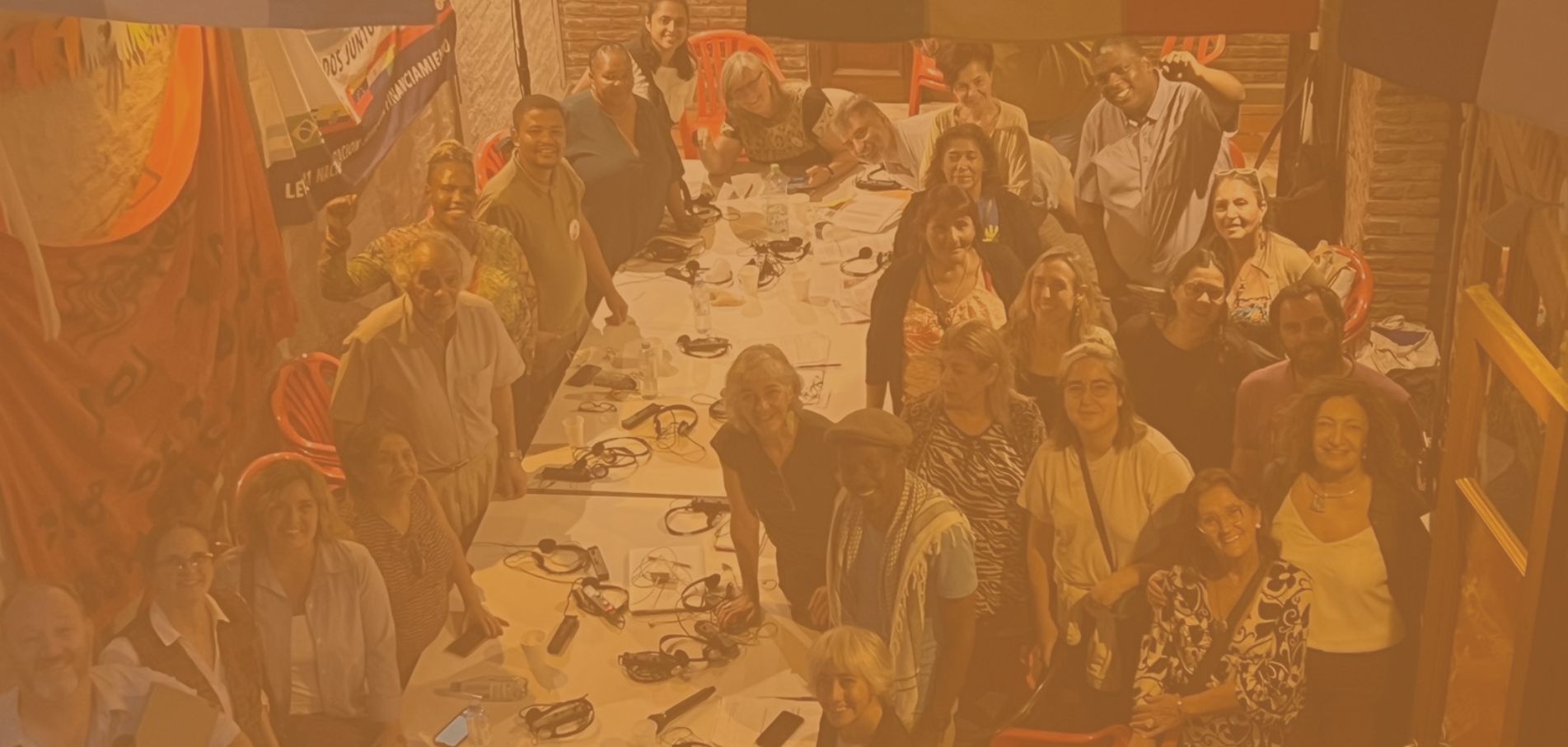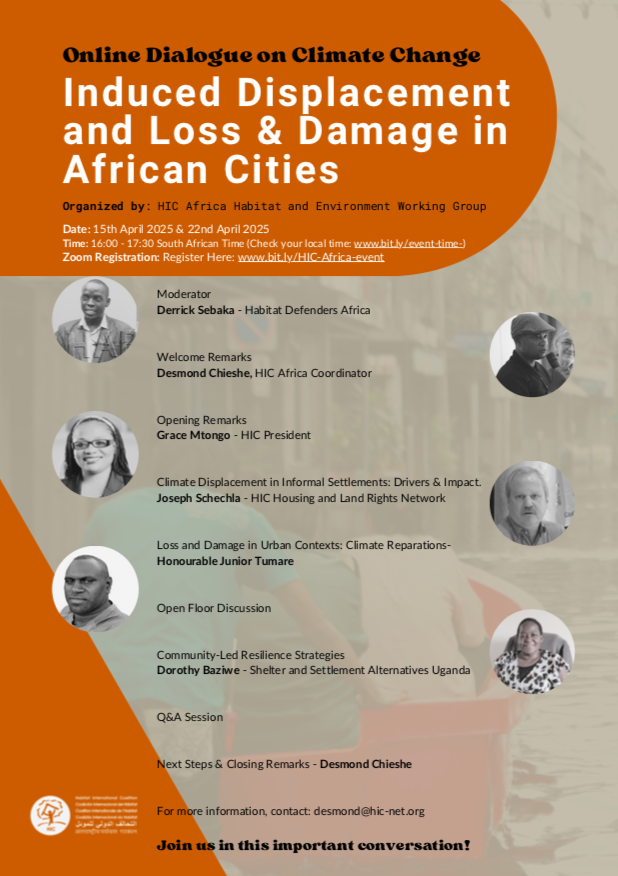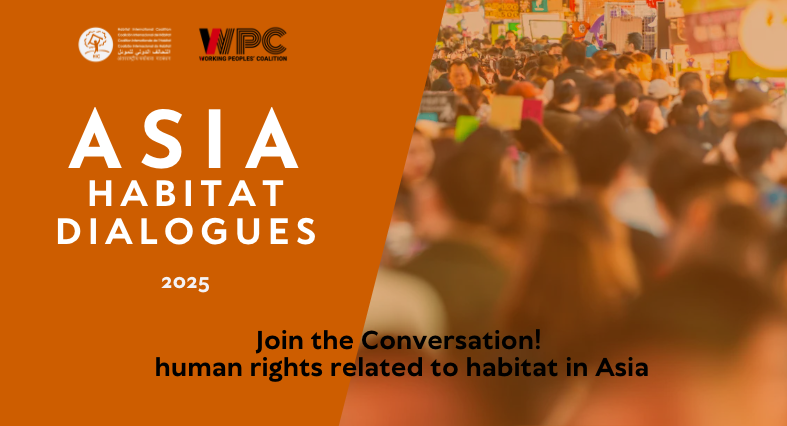HIC pide una acción mucho más audaz, inversiones y compromisos políticos de los Estados para hacer realidad los derechos humanos relativos al hábitat en el territorio
Hoy en día nos enfrentamos a dos grandes retos, diferentes pero interconectados: por un lado, la creciente financiarización de la vivienda, la tierra y la vida que profundiza las desigualdades globales y crea condiciones de vida precarias. Por otro lado, las consecuencias del cambio climático. Y, por supuesto, el siempre presente añadido del Covid-19, que los agrava.
¿Qué aspecto tiene una recuperación sostenible y resiliente de Covid-19 que promueva las dimensiones económica, social y cultural del desarrollo sostenible? Esta fue la pregunta principal del Foro Político de Alto Nivel de las Naciones Unidas sobre el Desarrollo Sostenible (HLPF) de 2021.
Si bien la pregunta es compartida, la forma de responderla es fundamental. Para HIC, la respuesta a esta pregunta viene en forma del Manifiesto colectivo de HIC “Habitat Voices”, que fue presentado y lanzado en un evento paralelo al HLPF el 9 de julio de 2021.
El manifiesto alinea múltiples y aparentemente diversos compromisos políticos en una visión post-pandémica que reúne los esfuerzos cívicos, públicos y privados en torno a la Agenda 2030. Reúne las voces de las organizaciones de la sociedad civil de todo el mundo – miembros de HIC activos como movimientos sociales, organizaciones de base, ONGs, academia y otros, hablando sobre cómo integrar los compromisos actuales y las obligaciones de los Estados en materia de derechos humanos para construir un presente y un futuro social y ambientalmente justos.
Para explorar el manifiesto con más detalle, haz clic en los siguientes recuadros que representan los cinco mensajes clave del Manifiesto que fueron elaborados por los Miembros de HIC el 9 de julio.
Cada uno de ellos habla de los acuerdos sistémicos y estructurales que alimentan los dos desafíos mencionados anteriormente. Como afirmó la presidenta de HIC, Adriana Allen, en su moderación de apertura Estos retos requieren un importante compromiso político e internacional. La contribución del sector de la construcción a las emisiones globales, por ejemplo, nos insta a explorar formas alternativas de reparar, rehabilitar y reutilizar el parque de viviendas existente. ¿Cómo poner fin a la oleada masiva de desalojos y desplazamientos forzosos que se producen en aras del beneficio económico, para abrir terrenos para el desarrollo especulativo?
El Manifiesto es testigo de la aparición y consolidación de múltiples formas de promover los derechos relativos al hábitat, principalmente por parte de la sociedad civil organizada y de un movimiento emergente de municipalismo progresista. La cuestión que se plantea ahora es cómo sostener, profundizar y financiar las medidas que se han desarrollado durante la pandemia (para hacer frente al sinhogarismo, redistribuir las viviendas existentes, establecer vacaciones de alquiler e hipotecas, suspender los desahucios, etc.) más allá de la situación actual.
Presented by Steve Ouma Akoth, Former Director of Pamoja Trust, Kenya, HIC Member
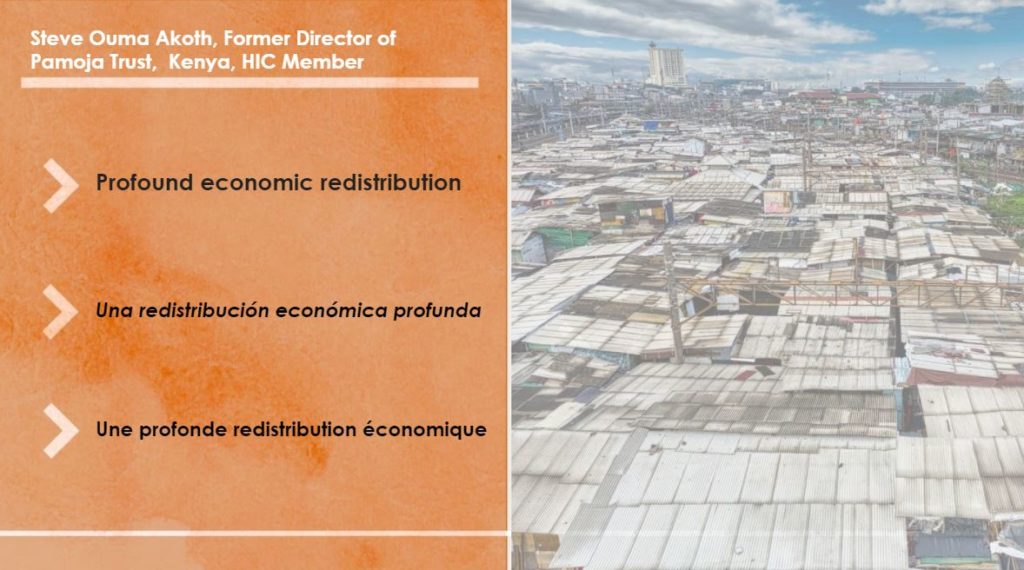
The first step towards a profound economic redistribution:
The economy must not become what defines us but what we use to become better dignified humans.
How? By removing the central role that the economy has been given in our times. It is the moment to return to a framework of identifying people and constructing the identity of people based on human dignity and not on economic positions and circulation.
We need to rethink the mantra of our times: Leave no one behind,the 2030 Agenda and the New Urban Agenda (NUA)
In the context of redistribution, we need to confront the moment of the pandemic as a question of reparation, making sure that those who have lost their incomes and wellbeing, are paid back.It also means re-institution, engaging other components of society, that return people back to positionality, that enhance human needs and ensure human dignity. It means epistemological strategy as an alternastive to economic positionality which is used to create boundaries.It also means accountability, because economic redistribution must take place to ensure economic justice.
A question of public policy
We all know that the pandemic is not only a health crisis, but an economic, political, cultural and social crisis that makes evident pre-existing inequalities. Our idea of economic redistribution calls for a revision of a public economic culture that embraces common good.
We call for an economic culture that takes evidence into account: citizens generate evidence, social movements all over the world every day produce evidence of how to generate better public policies, and those continue to be ignored.
Presented by Ana Falú, HIC Board Representative, Women’s &/or Feminist Movements
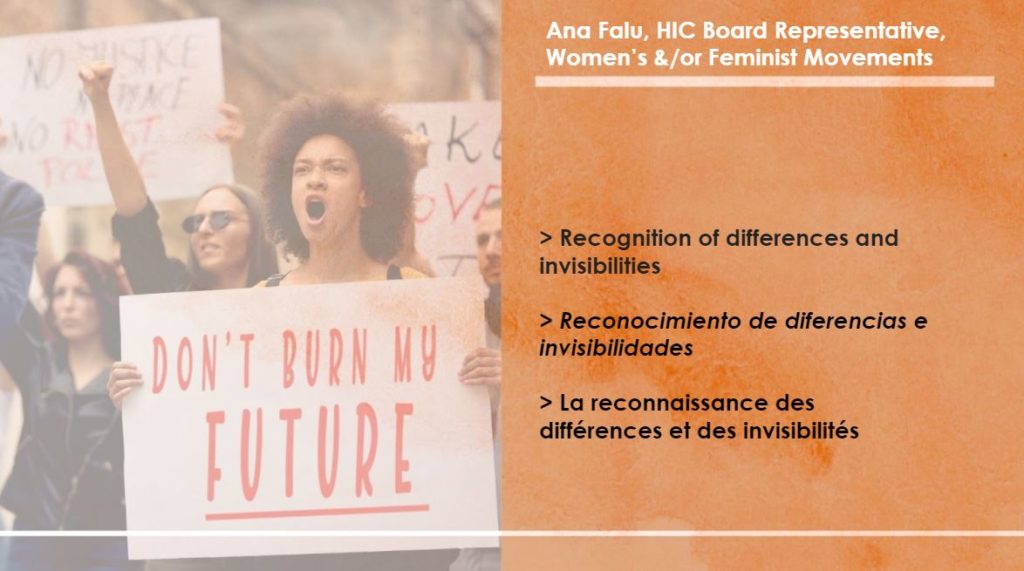
The Covid-19 pandemic and its accompanying uncertainty, particularly affects the world’s poorest majorities, including women. The 2030 agenda, that ambitious consensus of the world’s states, is falling further behind schedule.
The HLPF is key to agreeing the action plan we need for a post-pandemic recovery. It will be necessary to address the obscene inequalities, both pre-existing and structural, and those exacerbated by Covid-19. This will only be possible through a strong commitment to transformation.
From plural, diverse feminism, it is once again necessary to recognise, to reveal those who are omitted and to make the invisible visible. There is a global debt to women in particular; they are the omitted, the invisible, the undervalued. At the same time, they are part of at least 50% of the most discriminated groups, in systemic inequalities, for reasons of race, ethnicity, sexual identity, religion and more.
However, these women, in their resistance and demands, are an emerging political subject. Despite their continued omission from public policies these women demand rights, and are the most active defenders of life and of the deprivation and devaluation of nature, of the commons, of bodies, in particular those of women and girls. Women want to be different, but not unequal. They want recognition and redistribution, and this must be a central part of a post-pandemic action plan.
This plan of action has to acknowledge and integrate the realities of poverty, indigenous populations, Afro-descendant populations, migrants, refugees, LGBTIQ populations and acknowledge that all of these categories are inhabited by women across different locations and territories,
The pandemic has highlighted four issues:
- The growing violence of different types and origins that particularly affects women, a violence that is exacerbated for women in territories of conflict, vViolence that is aggravated by social isolation and deprivation at home.
- Care: more than ever, women are assuming the tasks of social reproduction and care, assigned by social stereotypes built up over millennia, while the majority live in conditions of overcrowding, precariousness, lack of essential services. Even in the worst conditions (ensuring food security with food shortages and lack of hygiene measures), these women take care of the social whole, in each working class neighbourhood, . ensuring in their homes not only the reproduction of life, but also education, emotional and affective balance, services and infrastructures.
- Connectivity, internet access: 46 million households in Latin America do not have internet connectivity, the virtual reality has widened the gap between wealth and poverty.
- Income: it is also impoverished women who suffer from economic systems that push them out, who work longer hours and always earn lower wages than their male counterparts.
The United Nations system, the states of the world, who have committed themselves to the SDGs, to the UNGA, to generating equality, have to guarantee a post-pandemic strategy taking into account that no action plan will be successful if it does not include women, invisible and diverse populations.
The Habitat Voices Manifesto calls for the politicisation of everyday life, bringing down the rhetoric of commitments and putting policies into practice.
Presented by Alexandre Apsan Frediani, HIC Board Representative, Europe
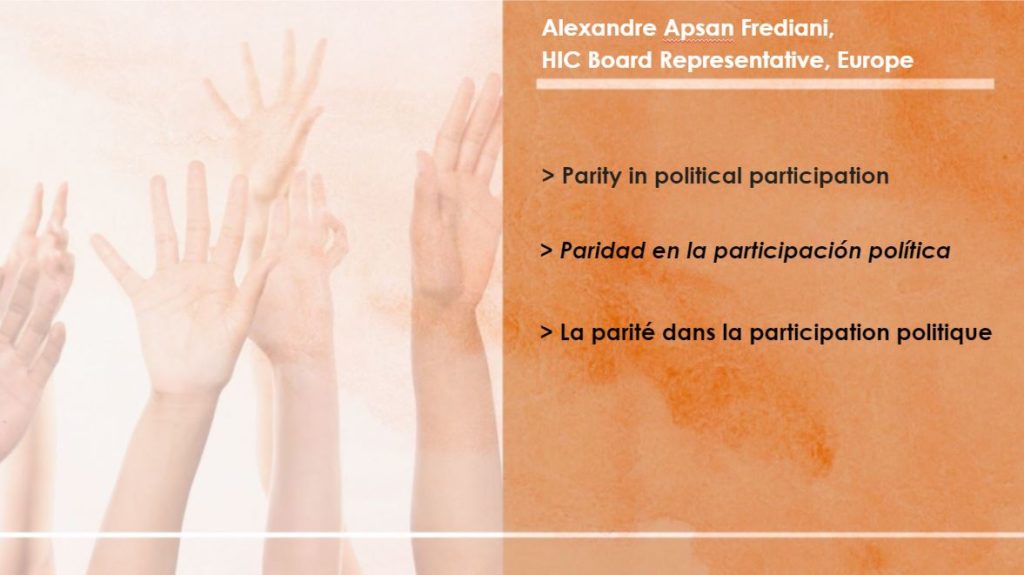
Our manifesto reflects HIC members’ concern that States need to do much more to protect people’s right to participate in decision making processes. This is a right recognised in various SDG targets, and particularly by article 25 of the International Covenant on Civil and Political rights, which states that “Every citizen shall have the right and the opportunity, to take part in the conduct of public affairs.” However, we are still experiencing uneven distribution of opportunities to engage meaningfully in decision-making. The conditions for participation are not there, and we are also not monitoring those effectively.
With that in mind, we have developed a set of 5 demands, that aim to tackle these unfair conditions shaping democratic processes.
- Firstly, we want the state to actively combat a culture of exclusion affecting participatory processes. We see this culture being shaped by the intersection of authoritarian, clientelistic, patriarchal, exploitative and discriminatory relations. HIC Members are seeing on the ground that this culture of exclusion needs to be explicitly acknowledged and challenged as it is perpetuating discrimination and obstacles, affecting all of us, but particularly marginalised and vulnerable groups. Actually, these barriers are explicitly highlighted in the Resolution of Human Rights Council on ‘Equal Participation in Political and Public Affairs’, which urges all States to take “all necessary measures to eliminate laws, regulations and practices that, directly or indirectly, discriminate against citizens in their right to political participation on the grounds of race, colour, sex, language, religion, political or other opinion, national or social origin, property, birth or other status, or on the basis of disability”.
Unfortunately, there are no explicit SDG targets or indicators directly addressing the State’s progress in relation to these barriers. Nevertheless, dealing with them will be fundamental to enable the SDGs to achieve the commitment of ‘leaving no one behind’.
- Our second demand is to guarantee the equality of all immigrants as natural and legal persons with corresponding rights. Here we want to highlight that immigrants have been particularly excluded from their right to participate in political and public affairs.
This demand resonates with target 2 of SDG 10 on inequalities, as it commits to empower and promote political inclusion of all, irrespective of origin and ethnicity among other social identities. Meanwhile, local and regional governments have also taken the initiative in this field by joining the “Human Rights Cities” movement, and ratifying the commitments outlined in various charters for human rights in the city. As a result, we see for example Vienna self-declaring itself a “human rights city” with special arrangements for integrating migrants and refugees. São Paulo has found ways to integrate refugees and migrants into local governance by establishing the Municipal law for Immigrants and Local Council for Immigrants, within the framework of the Municipal Secretariat for Human Rights. At the moment, SDGs do not systematically track these advancements and barriers for securing immigrants’ right to participation.
- Our third demand to address the unfair conditions shaping democratic processes is a call to extend decentralization and municipal autonomy processes, including mechanisms of direct citizen participation in the allocation and execution of government spending.
Decentralisation, with municipal autonomy and participation, is key to make governments more democratic and responsive to local needs and aspirations. This has been highlighted by the NUA as well as the Addis Ababa action agenda on financing and development. Nevertheless, the SDGs are not explicitly addressing the issue of decentralisation. SDG 16, target 6, outlines the need for effective, transparent and accountable institutions, however targets fall short to refer to more participatory and decentralised systems.
At the same time, SDG 3 on health and wellbeing also fails to mention any aspect related to participatory governance. We know from various studies that being meaningfully involved in participatory processes enhances people’s well-being and it is crucial to make health responses more effective. Recently, we have got several accounts demonstrating the effectiveness of municipal as well as community-led responses to the Covid-19 pandemic. Recovery plans need to make a stronger commitment towards decentralisation and democratic governance.
- Fourthly, we want to highlight the need to guarantee provision of social, economic, technical and legal assistance required to transform habitat together with inhabitants. Without the adequate assistance, the groups and inhabitants with less access to resources will always be disadvantaged in participatory processes. This is also recognised in Target 3 of SDG 11, which recognises the need to enhance capacities to participatory human settlement planning and management. This is even more meaningfully promoted in target 6.b of SDG 6 on water and sanitation, as it aims to support and strengthen the participation of local communities in improving water and sanitation management.
Various IPCC Reports outline that enhancing the capacities of communities to participate meaningfully in decision making processes is fundamental for achieving decarbonization targets and ensuring fair and just climate resilience. The COP 23 Talanoa Dialogues is an example of how these issues are now being incorporated into the UN Framework Convention on Climate Change.
For successful recovery, we need to urgently support and strengthen these participatory capacities through the provision of adequate social, economic, technical and legal assistance.
- Finally, to combat this culture of exclusion that is inhibiting democratic processes, we call for the broadening of the spaces for participation, so that they can create more responsive opportunities to the voices of women and marginalized groups in decision making. We cannot be replicating the business as usual approach to participation, and we need democratic processes to connect more directly with the spaces that different groups are already using to articulate their demands. This would expand the range of participatory opportunities, focusing on ‘safe spaces’, where groups are able to convey their own needs and aspirations on their own terms, as well as brave spaces, where these views are exposed, informed by and negotiated with others.
We see that this demand talks directly to Target 7 of SDG 16, which outlines the need to Ensure responsive, inclusive, participatory and representative decision-making at all levels. However, its indicators do not go far enough to recognise the need to make participatory spaces more grounded and diverse. In the meantime, this type of consideration has been articulated by other multilateral efforts, such as the Policy paper for the 2019 UCLG Congress on the Right to the City produced by HIC and The Global Platform for the Right to the City.
For more info: report by IIED co-developed with civil society groups and multilateral agencies a framework for ‘transformative urban recovery’: https://pubs.iied.org/sites/default/files/pdfs/2021-07/20296iied.pdf
Finally: SDG indicators are not enough to track advancements in relation to the conditions of participation. UCLG and UN-Habitat Voluntary Local Reviews and Voluntary Subnational Reviews are spaces where we can advocate for the inclusion of these demands. However, the key question is how to get these demands, which are recognised in different agendas, commitments and obligations, within contexts that cities are not interested in advancing them?
For recovery process and SDG reviews to take the right to participation seriously, we need a stronger alignment between SDGs, other multilateral commitments and human rights obligations.
Presented by Rana Ghanem, HIC Board Representative, Middle East/North Africa
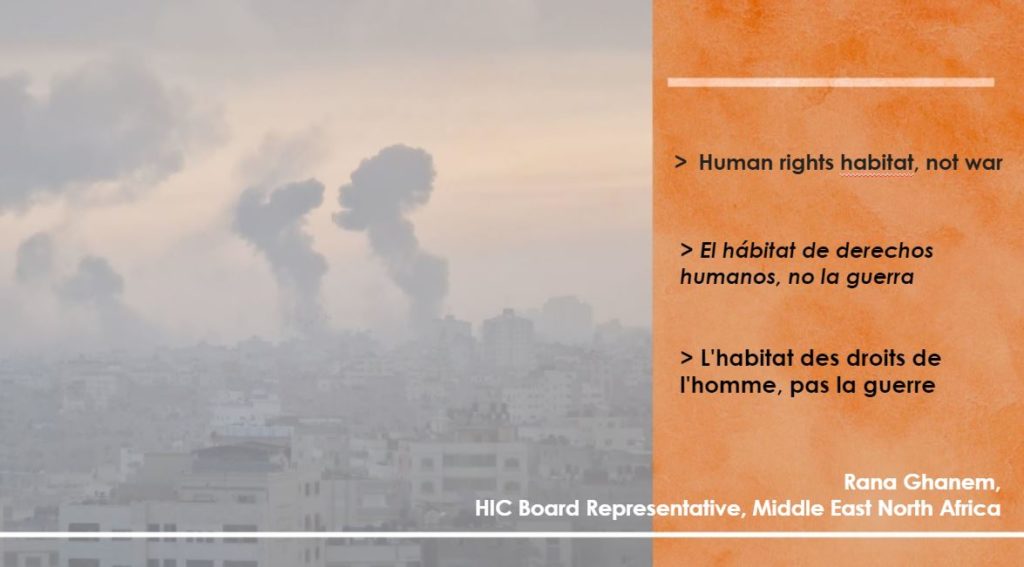
If we look at the reality in the region in the Middle East and North Africa (MENA), we find that large parts of this region form the headlines of war and conflict and occupation. It is the philosophy of suffering the ravages of destruction and the persistent targeting of civilians by direct methods, their lands, homes, and the continued building of settlements in the Lost living conditions, health, educational difficulties without the deterrent or the conscience of international standing. Here are Syria, Iraq, Libya, and Yemen, states that live the scourge of conflicts and wars that have made these countries see the goals that have arisen for the United Nations, far-fetched because the security and stability, human rights and sustainable development are in the shadow of the guns scourge of war.
This does not mean that the state in the territory is the only abuse, there are other states such as Somalia, Sudan, Lebanon, far of achieving the SDGs, and so the region as a whole, lives in the protracted crisis and continues to determine the level of realization of the SDGs according to the 2030 Agenda.
The Covid-19 pandemic has made the situation bad and complex, but water deficit, and the capacity of some countries in the region to bypass triggered this crisis, contributed to the declines and the story of the development plans in the region.
This is what puts us in front of the paradox between what is offered by the governments of the states of the region in the review of the voluntary national reports (VNRs) and the real situation on the ground, which was not reflected in reality in the country reports on the extent of work for the SDGs, especially in light of the crisis of the pandemic.
The situations of conflict and occupation still create many human rights violations, while the world community calls for a cessation of violence and conflict pleads to stay at home to counter the spread of the pandemic. There are large numbers of people have found themselves increasingly vulnerable to losing their homes and lands, in addition to the issue of the lost land that they thought it meet their livelihoods, not to mention the situation of the women of the increasing cases of discrimination and violence because of the conflict.
The phrase “A human rights habitat, not war” that we have emphasized in the statement justifying the vision of human rights that are to respect, protect and fulfil through the human habitat – in urban and rural areas – As specified in the agenda of Habitat III, for appropriate habitat “Required a regional approach and comprehensive, cross-sectoral planning, implementation, and governance of Human Settlements, which emphasizes the organic links between the rural and urban treated villages and cities as points on a continuum of human settlements in the ecosystem in common. (As contained in the agenda of Habitat II, Istanbul, 1996, Paragraph. 104).
We also refer to the line work of Vancouver, Habitat I, for the year 1967, which was approved in the second paragraph of that “The ideologies of states is reflected in their own policies and the human settlement. Because they are powerful tools for change, you must not use the expropriation of the people from their homes and land, or to entrench privilege and exploitation. There must be of human settlement policies compatible with human rights”.
Our statement calls for a human rights habitat in line with the approach of the call made by Secretary-General of the United Nations Antonio Guterres since March 2020, for a ceasefire world to focus on with the struggle to defeat COVID-19. A repeated call at the beginning of the Seventy-Fifth Session of the General Assembly of the United Nations in September 2020. And it is also the seventieth anniversary of the United Nations Convention refugees, when there has been added 3 new Millions of refugees in the last year, added to the total amount recorded that it is more than 80 Million.
However, States in the MENA region did not respond to any party for support, and some broke the ceasefire agreements protracted in the same period, and appeared of new hostilities, thus exposing the population affected by the conflict to new and humanitarian crises. Within some states, the authoritarian regimes and extreme suppression of the pushy youth population and the increasing levels during the pandemic.
We join the Secretary-General of the United Nations to claim the following:
- Immediate cease-fires in all fields of battle around the globe.
- Prompt and meaningful reallocation of resources away from offensive military activities and materiel in favor of public spending to alleviate all the negative consequences of the pandemic.
- Withdrawal and definitive end to all foreign and military occupations, in particular the economic, trade, military and diplomatic aid and cooperation with those illegitimate administrations beyond occupying States’ jurisdiction.
- All States and international organizations compliance with international and extraterritorial obligations to support the self-determination of peoples and nations, including to refrain from recognition of, cooperation and/or transaction with parties to these illegal situations and to bring them to an end.
- We also need to redouble efforts for the settlement of disputes, prevention and support countries with economies in post-conflict, including through ensuring the involvement of women in peace-building processes and toLay the foundations of the state.
The country of Yemen, which is fighting a war entering its sixth year between militias Iran-backed overturned on state and of the comprehensive national dialogue involving all political and social forces, has made the country experiencing the worst famine in modern history of the United Nations, that estimates that 81% Yemenis need help urgent necessary for life. The number of displaced is more than four million people, and nearly two million and a half children away from education, as is the use of thousands of children as soldiers in this war, with looting and the destruction of land and civilian objects and the cultivation of more than two million mines by the militias, that this situation, which is appointed by the town makes talking about difficult to navigate in the country on aid, as countries such as Iran refuses to submit reports on the development. Working at the same time to destroy and create development in our country and other countries in the region.
However, we continue to call for reform of the plan year to follow the 2030 agenda goals, to be in line with the United Nations commitments.
In the MENA region, to follow the dream of the UN Human Rights Without War is far away, as long as the permanent war is the focus of many of the foreign policies of states, which is still without addressing the Sustainable Development Goals, but the biggest obstacle to her. With the wars, poverty and famine, as we call upon the achievement of food security for the region at the same time, we believe that real development lies in the access to the land and food sovereignty.
Presented by Ana Pastor, HIC Board Representative, Latin America
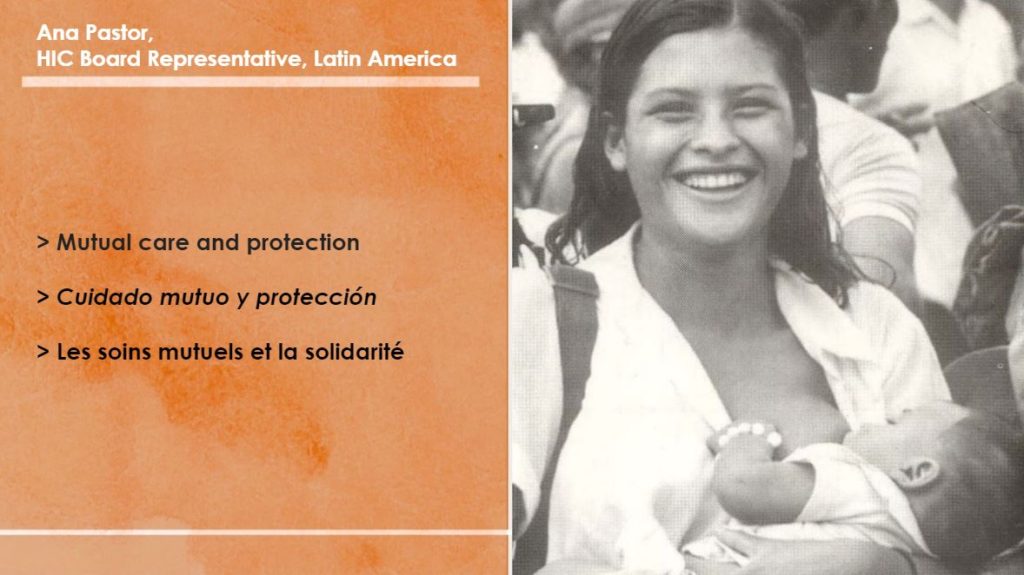
The fifth line of action of the Habitat Voices Manifesto is the one we point out as that of mutual care and protection of others in solidarity. It is a call to personal and social responsibility to take all measures and precautions to defend ourselves from Covid-19. However, for the population to take care and to take care of itself, the action and responsibility of States is key.
Throughout the pandemic, we have seen different types of attitudes on the part of States, attitudes that we can divide into two groups. On the one hand, we saw States that in this pandemic decided to care for and protect the population, while another group of States once again decided to care for and protect the economy, protecting a privileged minority. The latter thus decided to turn their backs on the goals of the 2030 agenda and on the people, because they increased inequality, generating more poverty, destroying the planet. Meanwhile, those other countries that have allocated human resources to care, that have developed action plans, that have involved different sectors of thematic and territorial expertise in their responses to the pandemic, are those that are demonstrating that they are moving in the direction of achieving the 2030 Agenda, even though they are facing many difficulties.
Ana Pastor gave as an example the actions carried out by the current government of Argentina since the pandemic. In the case of this government, which took office a few months before the start of the pandemic, with a situation of deep debt, it has developed several and many policies that go in the direction of the importance of care. A few examples of all the tasks that have to do with how a population lives and takes care of itself.
- Convening a commission of experts to monitor the crisis, experts not only from the health sector but also from other sectors: labour, etc.
- Allocation of a special fund for equipment, buying a lot of vaccines, avoiding the collapse of health care, using this fund to care for the most disadvantaged population.
- Establishment of a progressive tax system, with taxes on the highest incomes.
- suspension of evictions, moratoriums…
- In addition, in terms of community-based care, crisis committees have been set up, which are local groups, made up of local authorities but mainly community representatives. Their task is to identify the needs of the community in order to provide appropriate policies. A national programme called “the neighbourhood takes care of the neighbourhood” facilitates the work of these crisis committees.
It is possible that when a State takes care of its people, it encourages the population to take care of and protect itself. It is not easy, because the State is confronted with economic powers that deteriorate the environment for profit, that are extractivist, and that generate territorial inequality, which in turn derive from global policies that have been in place for years. A shift towards an economy at the service of the people and the care of mother earth requires political decision and the strength of the organised community, with the political leadership directed towards the fulfilment of the SDGs, which is why we call on the States that have committed to the agenda not only to take responsibility but also to commit themselves to the care and protection of their entire population and the planet. Especially the care of the most vulnerable populations. In areas of political action in solidarity.
We can come out of this pandemic better, but we can also go backwards, depending on the decisions of tates, and on the institutionalisation of their alliances and commitments.
More info related
The HIC Habitat Voices Manifesto
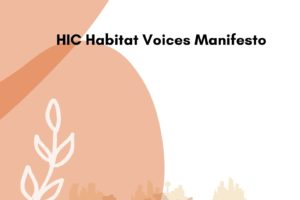
The Habitat Voices Manifesto brings together many voices that defen habitat-related human rights. The last version of the Manifesto, updated in July 2021 including HIC Members contributions, is available in English, Spanish, French and Arabic
Habitat Voices at HLPF 2021
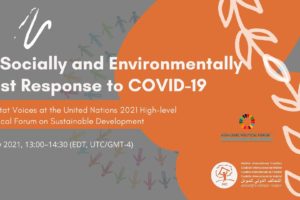
In this side-event HIC presents and launches a collective manifesto that highlights how responses to COVID-19 and its consequences can and need to uphold habitat-related human rights and build a socially and environmentally just present and future.
Video of HIC side-event
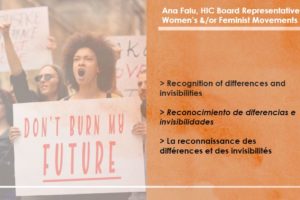
In this side-event, HIC presented and launched a collective manifesto that highlights how responses to COVID-19 and its consequences can and need to uphold habitat-related human rights and build a socially and environmentally just present and future.
